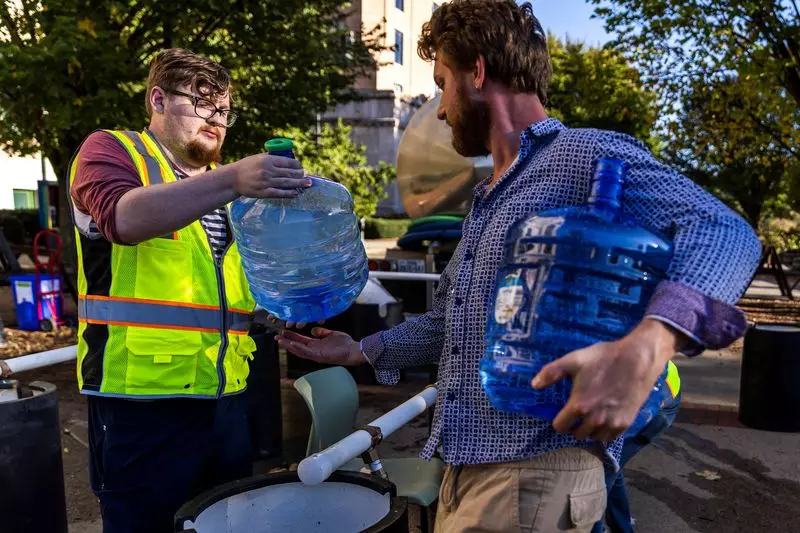In the wake of Hurricane Helene, a significant fallout continues to plague residents in parts of North Carolina, particularly in Asheville and surrounding areas. Since the storm made landfall in Florida as a Category 4 hurricane, its destructive path has been a devastating reminder of nature’s power, leading to catastrophic flooding, loss of life, and a critical water crisis that has left tens of thousands without access to this essential resource.
Over one million residents in the western region of North Carolina find themselves grappling with a severe water shortage as a direct consequence of Hurricane Helene’s aftermath. The storm caused significant damage to essential infrastructure, including municipal water treatment facilities, which have struggled to recover amidst the chaos. City officials reported that a fifth of the population in this region is currently without running water or experiencing low water pressure. The situation poses not only a logistical nightmare but also a public health concern as residents are left to navigate their daily lives with minimal access to clean water.
The cascading effects of the storm resulted in widespread power outages, impacting nearly one million homes across multiple states. In Asheville, where the municipal water supply system services upwards of 150,000 individuals, the crisis has reached critical levels. Water lines have burst, treatment plants have been compromised, and residents are now left to cope with the grim reality of dry taps. Many have been advised to boil any available water before consumption, further complicating daily routines and putting public health at risk.
As the city coordinates efforts to restore water services, community resilience shines through amidst the turmoil. Local volunteers have mobilized to establish distribution hubs in places like Pack Square Park, where drinking water and ready-to-eat meals are being shared among those affected. The outpouring of support from local businesses and organizations illustrates a community united in the face of adversity.
Notably, local business owners like Jordan Lance, who runs Buxton Chicken Palace, are contributing their resources to help those in need. Lance and his team are preparing hot meals daily and distributing them to the community, an act of kindness that resonates deeply during these challenging times. While he expresses concern for the future of his business without running water, his commitment to helping others takes precedence. Such grassroots efforts reflect the community’s shared struggles and determination to support one another until normalcy returns.
Despite the collective efforts to provide support, the struggles faced by residents are palpable. Many individuals find themselves making profound sacrifices in their daily lives. Rachel Simpson, a resident of Asheville, has resorted to relying on friends for water and has had to forgo bathing, washing clothes, and even flushing toilets. Acknowledging that restoring water services could take several weeks adds to her frustration and helplessness.
The situation is no less dire for businesses, where the lack of water compounds the challenges of limited operational capabilities. Harrison Fahrer, co-founder of Cellarest Beer Project, exemplifies the concern voiced by many local entrepreneurs. Without adequate water supply, not only is beer production at a standstill, but the looming financial repercussions threaten to exacerbate the economic impact of the hurricane on the community. Individuals like Fahrer understand that access to water goes beyond personal inconvenience; it encompasses the broader implications on livelihood and job security.
As the weeks progress, the situation remains fluid. Leaders at all levels of government, including President Joe Biden and Vice President Kamala Harris, have engaged with local authorities to assess the damage and co-ordinate recovery efforts. They are well aware of the colossal task at hand—not just in restoring basic amenities but also in reviving and uniting communities devastated by loss. The Federal Emergency Management Agency (FEMA) has mobilized to ensure water is being distributed strategically, but restoring water systems may take longer, leading to ongoing frustration and uncertainty.
Schools, hospitals, and businesses continue to grapple with the repercussions of the water crisis. Asheville City Schools Superintendent Maggie Fehrman emphasized that resuming classes is contingent on securing adequate water supplies. This underscores the interconnectedness of the crisis; restoring access to this vital resource is fundamental to rebuilding daily life in the community.
The challenges faced by North Carolinians post-Hurricane Helene are multilayered and intertwined. While the immediate focus centers on water restoration, the emotional and economic impact lingers. The community’s resilience is evident in acts of solidarity, yet the path to recovery will require ongoing support and efforts from both local leaders and citizens alike. Ultimately, the aftermath of Hurricane Helene serves as a powerful reminder of the importance of community and collective action in navigating the tumultuous waters of disaster recovery.

